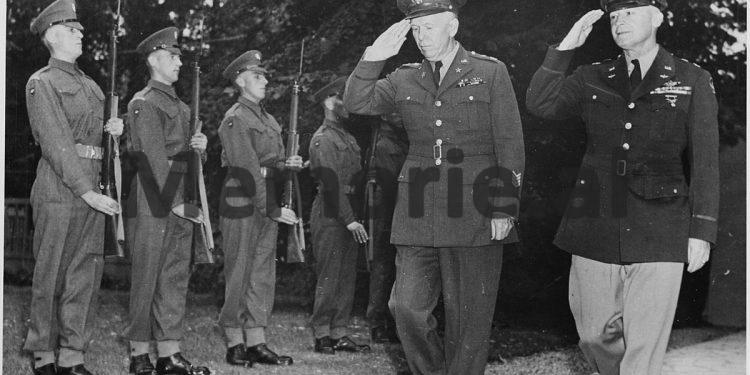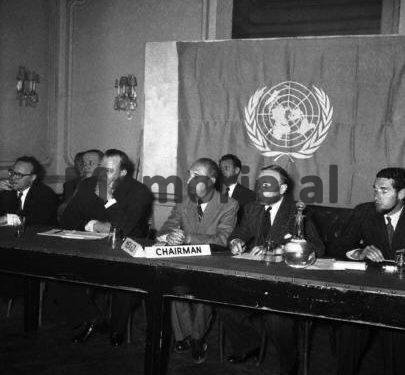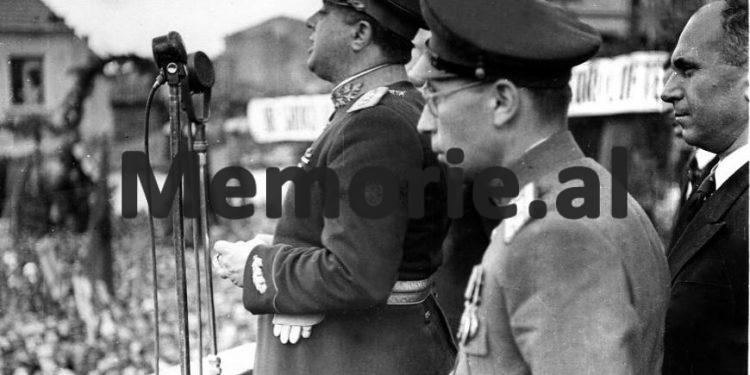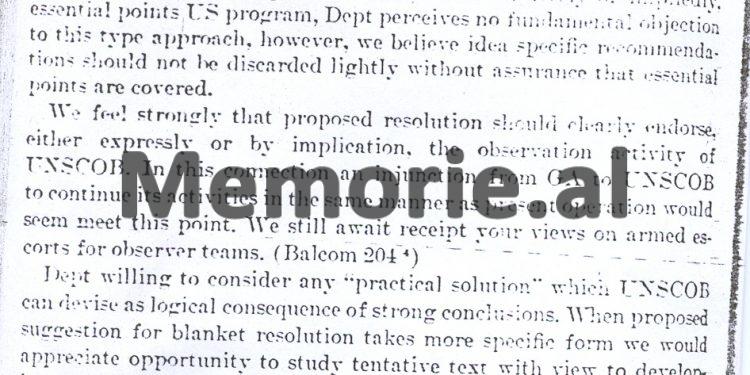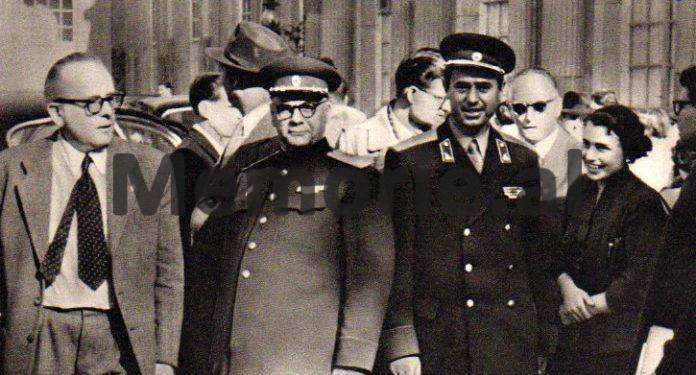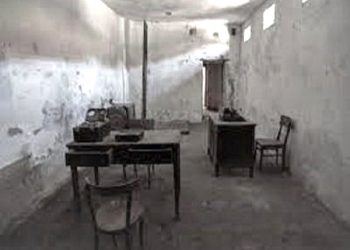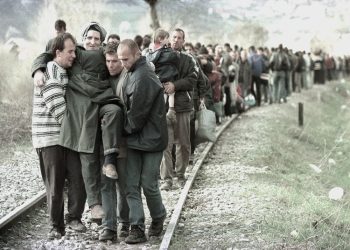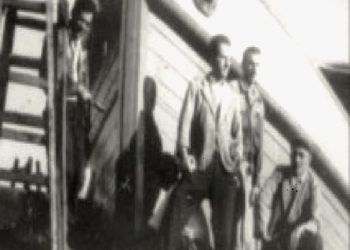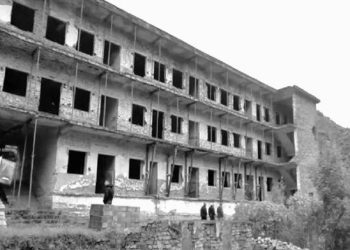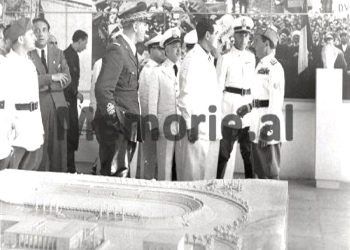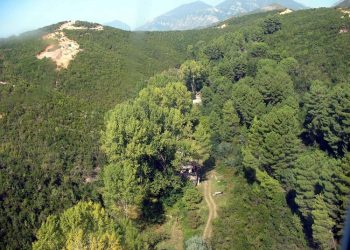Dashnor Kaloçi
Memorie.al publishes for the first time top secret documents of the US State Department, which shed light on the US diplomatic activity in the UN General Assembly in 1948, to stop the communist government of Tirana headed by Colonel-General Enver Hoxha, in her interference in the internal affairs of Greece and the military aid she provided to the communist guerrillas of General Markos Vafjadhis. As well as the protest notes that official Tirana presented to the United Nations Assembly where it complained that they were interfering in its internal affairs.
For five years, from 1945 to ’49, during which time the Greek civil war lasted between Prime Minister Caldaris’s government forces (ELLAS) and those commanded by communist partisan guerrillas (EAM). by General Markos Vafjadhis), the communist government of Tirana headed by Enver Hoxha, not only interfered in the internal affairs of Greece, but it gave great support and assistance to the Greek communist forces of General Markos, which consisted of: military equipment and supplies, food, clothing, etc. Not only that, but during those five years, the Albanian territory and its ports became the main bases where thousands of tons of food and military equipment were unloaded, coming here through the communist countries of Eastern Europe, led by the Soviet Union. Aid which was intended for the Greek communist guerrilla forces of General Markos Vafjadhis. The whole attitude of the communist government of Tirana, towards the problems that Greece was going through at that time, became a problem until the United Nations, where its General Assembly, several times considered the complaints of the Greek government against the interventions of Tirana. official in the internal affairs of the Greek government, repeatedly warning the government of Enver Hoxha to refrain from those actions. Also to prevent the activity of official Tirana in the internal affairs of Greece, as well as some other communist states of the Balkans and Eastern Europe, at that time the US government was engaged, which together with some of its allies , such as England, France, Italy, etc., made all the political, diplomatic, and military demarches to assist the Greek government forces in their fight against the communist forces that at that time controlled 1/3 of the territory of Greece. The efforts of the US government and its allies in helping official Athens in the years 1945-’49, are clearly seen in a series of archival documents such as: reports, telegrams, radiograms, resolutions, memoranda, etc., of the State Department, sent to its embassies or military missions accredited in various countries of the world. Some of these documents (in the years that followed) were found and translated by the communist government of Tirana, with the idea of making them public in a special book, which would expose the activity of the American imperialists and their tools in their efforts. to prevent the internationalist aid given to the partisan war in Greece by the peoples of Albania and Bulgaria, and the betrayal of the Titoist Yugoslavia, especially after the Informbureau resolution ”.
The issue of the Greek border at the UN. – US Initiative
This chapter deals with the entire political-diplomatic activity of the State Department in 1948 in connection with the discussion in the General Assembly and the Fifth Commission of the United Nations, of the Greek border issue. The extensive documentation contained in this chapter, reports, radiograms and telegrams from the State Department or US diplomatic and military embassies and missions abroad, extensively reflects all U.S. policy and political activity related to the suppression of the partisan movement in Greece and the establishment in that place of power of the local bourgeoisie that would serve the expansionist and hegemonic interests and goals of the USA in Greece. They reflect the political-diplomatic activity to manipulate the UN and to use it as an instrument of dictatorial politics and interference in the internal affairs of other peoples. This is evident in the manipulation of the UN by the US in the issue of admission as a member of the UN of Albania and other countries of the former socialist camp as well as the machinations and behind-the-scenes activity in the UN for editing and adopting US resolutions or states others, tools of American imperialism related to the Greek issue, or in the creation and use of UN bodies, such as the UNSKOB (UN Special Committee on the Balkans), as instruments of US policy or intervention and pressure; against the interests and peoples of the Balkans. Regarding this issue, these documents reflect the activity of the US State Department in directing and coordinating US political and diplomatic actions with those of the Greek quisling government and other allied countries, both in the framework of the work of the UN General Assembly, as well as in the framework of Allied relations and contacts with the USSR and the Balkan countries. Most State Department circulars and radiographs contain directives and instructions given by it to US embassies and missions or to US representatives at UNSKOB, etc., on the positions and tactics they will use or the texts of resolutions, reports, or memoranda they will use. to be included in the documents of the UN and its organs and agencies related to the Greek issue and the Balkans. In the vast majority of the documents in this chapter, the main place is occupied by those related to the US political-diplomatic and military activity in Greece and the partisan struggle of the Greek people and the assistance provided to them by neighboring countries, especially Albania and Bulgaria. In the latter, in the regional or special radiograms and in the reports of the State Department and of the American missions in the Balkans, the differentiated attitude they held with the public or UN condemnation of the internationalist aid given to the partisan war in Greece stands out. Albania and Bulgaria, of the “help” from the Titoist Yugoslavia, especially after the resolution of the Informbureau and the open expression of the betrayal of the Titoists of Belgrade. Many of the documentary materials in this chapter highlight the very harsh and hostile attitude of the United States towards our country and the internationalist and fraternal assistance of our people to the partisan liberation struggle of the Greek people. Therefore, even in the directives and instructions of the US State Department, the main place is occupied by those related to their pressures and interventions against our country through the political and diplomatic activities of the US and Greek allies, such as the case of obstruction of accession. of Albania in the UN, incitement of diplomatic demarches to our government by the governments of France, etc., etc. Below are the translated texts of some secret radiograms and telegrams exchanged between the State Department and US missions abroad, related to their activity mentioned above.
State Department: Will Albania recognize Marcos’ junta?
“501.BB Balkan / 1-348, Telegram
Deputy Secretary of State to the US Representative to the UNSCOB. (Kirk.) In Thessaloniki.
Secret. Washington. January 3, 1948 2. Balcam. 63.
The Department considers the UNSCOB resolution useful as a warning and as a basis for possible future action. In anticipation of further major developments the best role that UNSCOB could play would be to collect authentic data on the assistance provided to Marcos (Marcos Vafadhis-president and war minister of the “Provisional First Democratic Government of Greece ”) from foreign sources. We hope that in this regard, the committee will make every effort before the full staff and equipment arrive. You will soon be instructed on what decision to make regarding the equipment. If Albania, Bulgaria or Yugoslavia were to recognize the Marcos junta (the Department seeks to avoid the use of the word government) as an insurgency, a warring party or as a government, you would have to propose or support a resolution saying that this action is in direct conflict with the resolution of the General Assembly of 21 October 1947. In the event that, in addition to recognition, there is evidence of a continuation or increase of aid to the Junta, any UNSCOB report stating that such aid constitutes an aggression or other violation of the Charter, should include not only the issue of facts on the basis of the data collected, but also a careful assessment of the consequences deriving from the Charter. For this reason, in order to ensure freedom of tactical action at the UN and to better coordinate the US position at UNSCOB with US policy, the Department would like to be given the opportunity to study the text of any kind of resolution. regarding the recognition of the junta or aid to see if the resolutions are finally adopted by the UNSCOB. If UNSCOB provides clear evidence that Albania, Bulgaria, or Yugoslavia are increasing aid, but not accompanying it with the recognition of the Junta, then you should propose that all facts be sent immediately to a report to the Secretary UN General Assembly with a request to distribute it to member states. In this case the Department would prefer the Committee to avoid the violence of specific recommendations, in order to allow for flexibility of action.
Sent to Thessaloniki, repeated to Athens, London, Belgrade, Sofia.
(Marshall)
US: Albanian government is supporting Greek guerrillas
Deputy Secretary of State’s telegram to Gerald Dre in Thessaloniki. Limited. Washington, 2 April 1948. 86. Balcam 131 to Mr. Drew.
The Department fully agrees with the UNSCOB’s efforts to ensure continued action in relation to the Albanian protests against the UN Secretary General (refer to Combal Telegram 127). We spoke with the Greek Embassy on the points requested. We think that the communication that the Albanian side made to the Secretary General on March 17, gives us the opportunity for UNSCOB to respond directly to the Albanian government, noting that that communication reflects the lack of sincerity on the part of the Albanian government and by highlight all UNSCOB reconciliation efforts and Albanian intrasigence. The statements that UNSCOB will make may include an allusion to Albania’s candidacy for membership in the UN, as well as reflect the discrepancy between Albania’s attitude towards UNSCOB and the cooperative and cooperative attitude required by the Charter. The Department is very interested in data on military activity in Albania and recommends that the UNSCOB declaration include the above data to make any impact. This problem should be outlined in the following lines: “UNSCOB is very concerned about the data that speak of the military activity taking place in Albania in preparation for the large-scale support of the Greek guerrillas. UNSCOB sincerely hopes that these data do not stand because if they were true, UNSCOB would be obliged to urgently direct the UN attention to the serious consequences that such actions may bring. We suggest that this communication be broadcast both directly and through the Secretary-General and given wide publicity.
(Sent to Thessaloniki, Tel. No. 86 for the Balkan Committee. No. 131: repeated Belgrade No. 148, London 1146, Paris 1074, Moscow 346. (LOVETT)
Also known as Telegram no. 131, March 31, 4 pm from Thessaloniki: Albanian protests were related to “Greek provocations” and aimed at informing the Secretary General and the public
(501.BB Balkan 13-3148).
Note: Gerald A. Drew-US Deputy Representative to UNSCOB
(UN Special Committee on the Balkans)
UN Assembly: Albania should not allow Greek guerrillas on its soil
“501. BB Balkan 18-948: Telegram of the Secretary of State to Mr. Arthur W. Parsons in Athens. Secret. Washington, 9 August 1948. Balcom 197. We suggest that you recommend that UNSCOB immediately send a direct note to Albania in accordance with the following guidelines: UNSCOB has taken note of the fact that the Greek Army is engaged in offensive operations against guerrilla forces located very close to the Albanian border. In case of success by the Greek Army, it is likely that some, or all of these forces may try to escape by crossing the border into Albania. In the exercise of its functions, in an effort to develop good neighborly relations between Greece and Albania, as well as in the spirit of the General Assembly of October 21, 1947, which called on Albania not to take any action to go to the aid of the guerrillas. “UNSCOB expects Albania to either not allow the passage of guerrillas seeking to enter Albania, or to disarm or deport these guerrillas in accordance with recognized principles of international law.” If UNSCOB observer teams have meanwhile reported on the passage of fugitive guerrillas to Albania, then that note would allude to this fact. Such a note would put Albania in charge if the fleeing forces returned to Greece. A note of this nature may be transmitted directly to the Albanian government and a copy sent to the UN Secretary General for information.
(Marshall)
This message was also sent to the embassy in Greece with number 1131)
Tirana Government: The US is putting pressure on us
Regarding the US efforts to put pressure on our country to cut off internationalist aid to the partisan movement in Greece, two documents in the chapter in question are worth mentioning.
In a memorandum dated 18 August addressed to two officials of the Directorate for Southern European Affairs, Leonard I. Cromie of the Directorate for Greece, Turkey and Iran, at the State Department stated: “On 10 August, the Greek Ambassador made a visited Lovett (Deputy Secretary of State) and asked the US:
- a) or to request the intervention of the Russians in the Albanians in order to achieve the disarmament and internment of the fugitive guerrillas.
- b) or to make a direct tripartite request to the Albanians, USA-England-France, through the French minister (in Tirana) for the same purpose “. Mr. Cromie announced that the State Department had instructed Mr. Parsons to propose to the UNSCOB that a demarche be made in the same vein, as a result of which the UNSCOB resolution of 12 August was reached. He also noted the State Department’s view that the move would satisfy the Greeks; but on August 17, the Greek ambassador met with Mr. Jernmegan and filed another request for a direct tripartite demarche. (808.00 / 8-1848)
“501. BB Balkan / 9-248: Telegram
Secretary of State to the Embassy in France
Secret. Washington, 2 September 1948. Urgent. 3425.
Although the Department agrees to make the proposed tripartite demarche near Tirana (Department Telegram No. 3358, dated 28 August) it should be reserved as soon as it belongs to a possible further demarche against Moscow. Although, apparently, in Athens, the issue has already been raised, the Department suggests that the issue of the demarche in question should not be published until the Albanian response is received or the necessary time has passed for the response in order to increase the possibility for a favorable response from Albania. The Department is of the opinion that this demarche should not be directed in a narrow and specific way in the disarmament and internment of Greek guerrillas in Albania, because such a bias could presuppose a recognition of the guerrillas, as a warring party, from which it would arise. the need to find specific obligations under international law for their disarmament and internment. On the contrary, that demarche must be general and with the aim of achieving that Albania takes the necessary steps in accordance with the obligations deriving from international law, to prevent the outbreak of armed expeditions from the territory of Albania against the Greek government. . We fear that the demarche, as formulated in the French draft instructions (embassy telegram No. 4424, dated 25 August), would result in a merely equivalent response to Albania as it is already disarming and interning the Greek guerrillas. To prevent such a response, the French minister may refer to the Albanian allegations made in this regard in Albania’s August 24 note to the UN Secretary-General and the same day Radio Tirana show that mentioned the disarmament and internment of 1322 guerrillas who had recently crossed the border. While acknowledging the possibility that some guerrillas have in fact been disarmed and interned, he may point out that there is evidence of recent guerrilla movements from Gramoz to Albania, the number of which significantly corresponds to the figures mentioned. in the Albanian note and in the show of Radio Tirana, a number that probably reaches 5,000 people, and that there are certain data that a large number of them have re-entered Greece at other border points. For example, about 1,200 people are estimated to have reached the Vic region through Albania. UNSCOB observers have personally noticed that on the Bozhigrad-Bilisht road, parallel to the border with Albania, there was heavy and abnormal traffic at night and on 21 August they witnessed a powerful guerrilla attack. from the Albanian territory against the forces of the Greek National Army in the territory of Greece although the Albanian border post was located near the scene. The French Minister could conclude by saying that in the light of such facts Albania would convince the world public that, as it claims, it does not interfere in the internal affairs of Greece, allowing, as Greece has repeatedly done, UNSCOB to conduct the inspection. of the region, in accordance with the special request of the General Assembly in dealing with the question of the borders of Greece. The Department is of the opinion that the French Minister should point out to the Albanian government that its demarche on behalf of the USA, England and France is done to give full diplomatic support to the three governments in the work of the UN bodies. dealing with the case of Greece and that it reflects the strong position that all three governments will hold at the 1948 UN General Assembly session in support of the UNSCOB. The Department understands that this proposal differs somewhat from the English position (Embassy Tel. No. 4423, dated 26 August) and appreciates England’s tactical objective of suggesting that the reference to UNSCOB be removed. However the Department thinks it would be a major mistake from the point of view of diplomatic strategy to show that so-called “satellite countries” have caused the Western Powers to waver in their support for the UN as an instrument of peace. In case the Albanians reject the proposal for an inspection by UNSCOB, which is expected, the French Minister in Tirana is necessary to ask them if they have any other constructive proposal to make, to achieve objective verification. of Albanian actions. It is understood that this proposal is made in line with the UN peacekeeping mission. It is understandable that the French minister should be left free to formulate the demarche and the above suggestions are not intended to force the French Foreign Ministry to adhere to a certain wording of the instructions. On the contrary, these suggestions are more in order to emphasize the way of presenting the issue through this demarche, which, in the opinion of the Department, will either result in a favorable action on the part of Albania, or, what is most likely, to provide us with a clear demonstration to the public of the Albanian refusal to allow a full investigation of Albania’s conduct and actions. Please urgently discuss the above with the French Foreign Office and the Foreign Office of England and let us know what action has been taken. If you consider it necessary to arrange the details, we suggest that you arrange with them the channels of communication with the department for the above-mentioned issues./Memorie.al
(Marshall)





